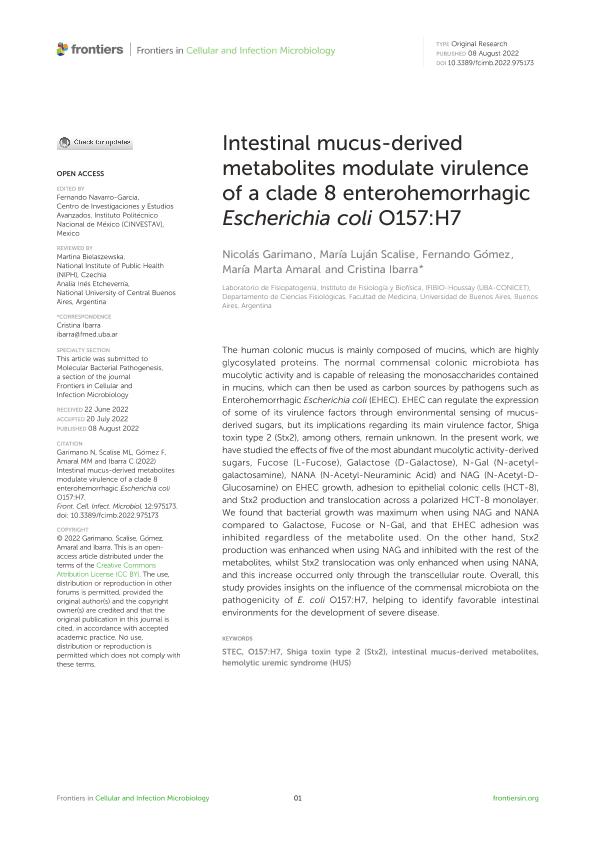Artículo
Intestinal mucus-derived metabolites modulate virulence of a clade 8 enterohemorrhagic Escherichia coli O157:H7
Garimano, Nicolás Ezequiel ; Scalise, Maria Lujan
; Scalise, Maria Lujan ; Gómez, Fernando Daniel
; Gómez, Fernando Daniel ; Amaral, María Marta
; Amaral, María Marta ; Ibarra, Cristina Adriana
; Ibarra, Cristina Adriana
 ; Scalise, Maria Lujan
; Scalise, Maria Lujan ; Gómez, Fernando Daniel
; Gómez, Fernando Daniel ; Amaral, María Marta
; Amaral, María Marta ; Ibarra, Cristina Adriana
; Ibarra, Cristina Adriana
Fecha de publicación:
08/08/2022
Editorial:
Frontiers Media
Revista:
Frontiers in Cellular and Infection Microbiology
ISSN:
2235-2988
Idioma:
Inglés
Tipo de recurso:
Artículo publicado
Clasificación temática:
Resumen
The human colonic mucus is mainly composed of mucins, which are highly glycosylated proteins. The normal commensal colonic microbiota has mucolytic activity and is capable of releasing the monosaccharides contained in mucins, which can then be used as carbon sources by pathogens such as Enterohemorrhagic Escherichia coli (EHEC). EHEC can regulate the expression of some of its virulence factors through environmental sensing of mucus-derived sugars, but its implications regarding its main virulence factor, Shiga toxin type 2 (Stx2), among others, remain unknown. In the present work, we have studied the effects of five of the most abundant mucolytic activity-derived sugars, Fucose (L-Fucose), Galactose (D-Galactose), N-Gal (N-acetyl-galactosamine), NANA (N-Acetyl-Neuraminic Acid) and NAG (N-Acetyl-D-Glucosamine) on EHEC growth, adhesion to epithelial colonic cells (HCT-8), and Stx2 production and translocation across a polarized HCT-8 monolayer. We found that bacterial growth was maximum when using NAG and NANA compared to Galactose, Fucose or N-Gal, and that EHEC adhesion was inhibited regardless of the metabolite used. On the other hand, Stx2 production was enhanced when using NAG and inhibited with the rest of the metabolites, whilst Stx2 translocation was only enhanced when using NANA, and this increase occurred only through the transcellular route. Overall, this study provides insights on the influence of the commensal microbiota on the pathogenicity of E. coli O157:H7, helping to identify favorable intestinal environments for the development of severe disease.
Archivos asociados
Licencia
Identificadores
Colecciones
Articulos(IFIBIO HOUSSAY)
Articulos de INSTITUTO DE FISIOLOGIA Y BIOFISICA BERNARDO HOUSSAY
Articulos de INSTITUTO DE FISIOLOGIA Y BIOFISICA BERNARDO HOUSSAY
Citación
Garimano, Nicolás Ezequiel; Scalise, Maria Lujan; Gómez, Fernando Daniel; Amaral, María Marta; Ibarra, Cristina Adriana; Intestinal mucus-derived metabolites modulate virulence of a clade 8 enterohemorrhagic Escherichia coli O157:H7; Frontiers Media; Frontiers in Cellular and Infection Microbiology; 12; 8-8-2022; 1-11
Compartir
Altmétricas



